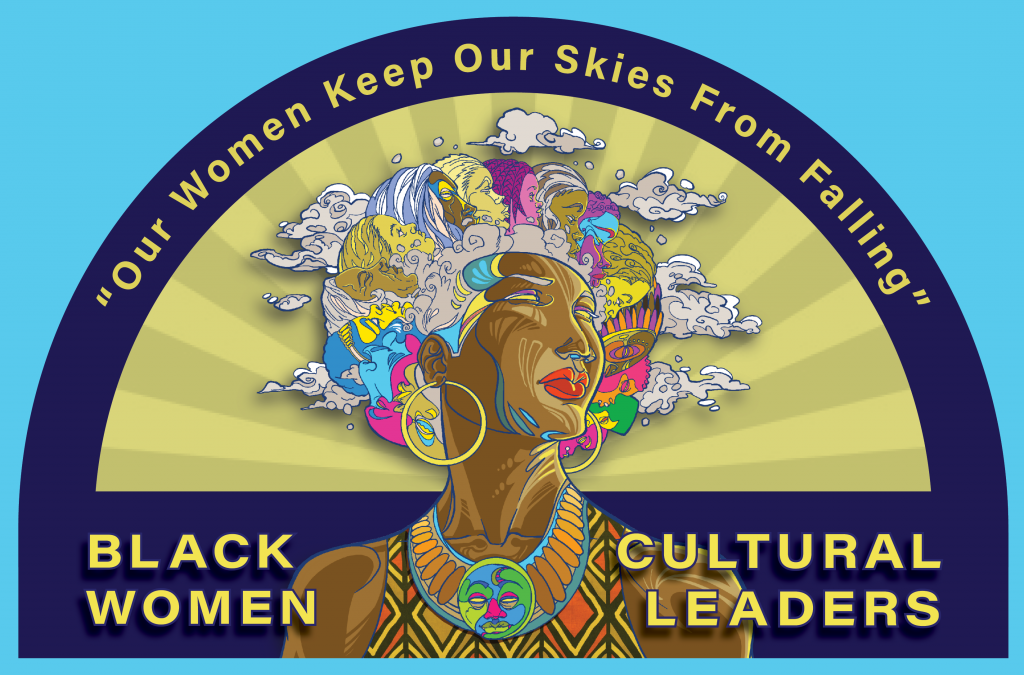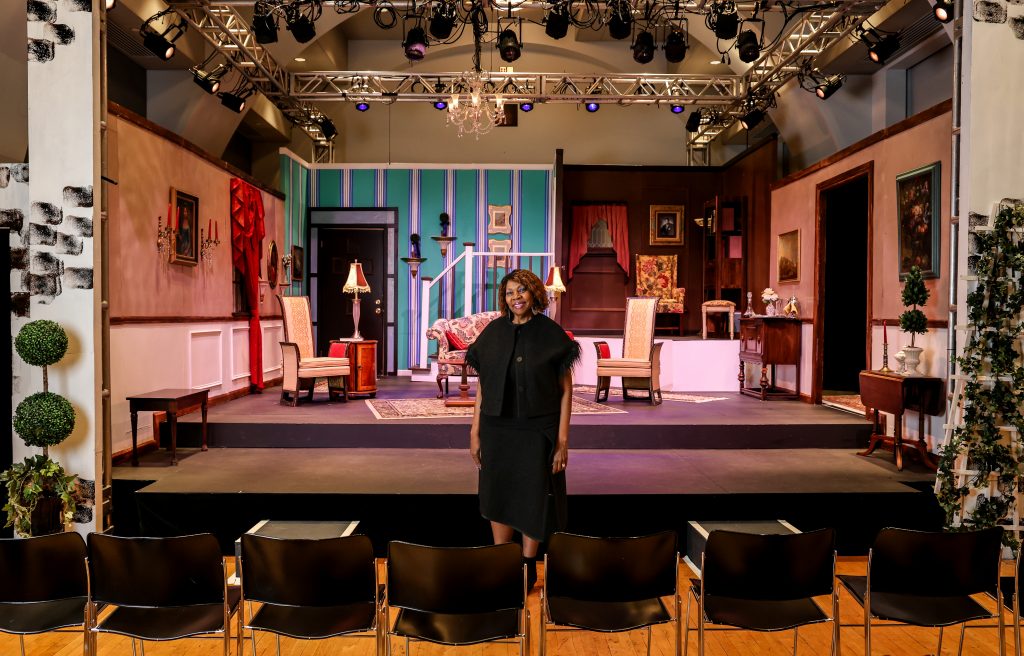The unwavering community theater leader reflects on the organization’s three decades-long impact on Pittsburgh—and the continuing importance of centering Black culture.
By Ervin Dyer, Madison Stokes, and Obianuju Okoye
This story is part of a series on Pittsburgh’s Black Women Cultural Leaders.
Joyce Meggerson-Moore spent her formative years in rural Arkansas, attending elementary school in Fulton and high school nearby in Hope. Her father worked at Lone Star Ammunition Plant and in various community jobs. Her mother was always at home tending to vegetable, fruit, and flower gardens.
The youngest of five children, she grew up on farmland that had been in the family for generations. Her family used the land to raise farm animals and produce hay, timber, cucumbers, and potatoes.
Meggerson-Moore received her bachelor’s degree in Speech and Drama Theater Arts at Hendrix College and her master’s degree in Rehabilitation Counseling at University of Central Arkansas. She received her doctorate degree in Counseling Education at Saint Louis University, Missouri.
She came to Pittsburgh more than 30 years ago and has had a long career as a mental health professional—at Chartiers Community Mental Health (MH) and Mental Retardation (MR) Center and later as program director of Allegheny East MH/MR Center INC.
Soon after she arrived in Pittsburgh, she also became involved as a volunteer with New Horizon Theater, where she is currently chair of the board of directors.

New Horizon was recently named one of Pittsburgh’s 16 Cultural Treasures and with the support from the Heinz Endowments and the Ford Foundation, Meggerson-Moore and the company are planning to ramp up community engagement and artist support while continuing to offer the dramatic presentations that have won them a loyal following over the past three decades. The theater is also seeking a permanent space that they can call home.
In Pittsburgh, there is a lack of appreciation for the history of African American people. This history, when combined with other cultures, can provide diversity to this city, and improve the cultural quality of life for all.
Dr. Joyce Meggerson-Moore
Dr. Meggerson-Moore is fueled by reminding herself that, “I perform my best at whatever paid or volunteer task that I undertake; my handshake is my bond.”
Why do you do this work? What inspired you?
I started working in the theater while attending undergraduate school. It was a predominantly white college so there were no roles for African Americans in the stage productions, so I worked on set design and other theater work. I received a small role in a musical when a visiting actor from New York came to campus for a title role. I enjoyed attending theatrical productions on the campus and received a B.A. in Theater Arts (Speech and Drama). I did not work again in the theater, but received graduate degrees and continued a career in Counseling Education and Administration in Community Mental Health. When I moved to Pittsburgh and as I volunteered in the community, [Elva Branson] asked me to help with a reception for an organization that she was starting, New Horizon Theater. I continued to volunteer in various capacities since 1992. As we established the mission of the organization, I soon became chair of the board of directors.
Why is this work important in a city like Pittsburgh?
I think that art is important in any city, but as in many cities, and in Pittsburgh, there is a lack of appreciation for the history of African American people. This history, when combined with other cultures, can provide diversity to this city, and improve the cultural quality of life for all.
In the past year, what aspect of your work are you most proud of?
When New Horizon Theater, Inc.’s work was recognized as a Cultural Treasure, it allowed us to continue to show our worth to the City of Pittsburgh, the region, and the nation. It gave us financial support to plan better for our organization, our patrons, and for the city; and to carry out our artistic mission. New Horizon Theater was founded with the mission to bring to the greater Pittsburgh area consistent, high-quality cultural events, reflecting African American points of view, and to provide an ongoing venue for ethnic writers and performers to further their professional development. I continue to be proud and amazed that we raise funds for operations with an all-volunteer corps and produce regional, local plays and world premieres.
What is the importance of cultural knowledge?
Cultural knowledge gives us a reason for our existence. It tells us from whence we came, our purpose for being here, and helps us to plan for our future.
How did you learn this lesson—in what ways was cultural knowledge passed on to you?
This lesson was just a way of life as I grew up, something that was ingrained in our family from living it over and over on a daily basis. It was passed to me since childhood by my parents. It was not called “cultural knowledge” but was an equivalent to this knowledge as I lived and learned about my history, who I was, gaining self-respect, and appreciating the value of my community, family, and race.
What was some of that knowledge?
I learned who I was, to appreciate myself, family and community and I improved on that through education, stressed in spoken and unspoken language in my household. I had to catch a yellow school bus traveling 50 miles a day. I had to be prepared with my school lessons before arriving at school. I had to do my homework as well as my assigned chores at home. I was not paid to do these things, but it was an expectation, as it was an expectation to be respectful of my elders, cousins, and other peers.

How do we empower/inspire the next generation of Black women cultural leaders?
We inspire by educating others; role modeling what we would like to see; showing others the process and the tools that we have to continue; demonstrating perseverance; and not giving up when we become tired or when the tasks sometimes may seem hopeless.
What skills are needed most for the work that you do?
Organizational skills, the ability to learn new technical skills, tenacity, perseverance, administrative skills, communication with people of all backgrounds, management abilities, recruitment of people to work at all levels of the theater, casting for productions, problem solving, fund-raising to pay artistic and technical crew.
What would you like your cultural legacy to be?
That I came from a small rural area and had parents and a community that shaped what I have become, that encouraged my educational pursuits from undergraduate through graduate school. I pride myself on being someone who has helped people when I served as administrator of a community mental health center and supported people daily with their mental health issues; that I was a volunteer director of a theater company which provides people the opportunity to work in front of and behind the scenes.
Do you have a cultural wish list for Pittsburgh?
I would like to see Pittsburghers attend and enjoy live stage performances on a regular basis – not only when company is in the city, not only when someone is having a special occasion, not only when they are “begged” to help with constant reminders that support is needed. My wish is that constant support of our theater company and the arts will not drain the energy from those sponsoring the seasons and we don’t have to repeat the same cries to be supported.
What’s next for you?
I’m planning a special annual event to draw more attention to our organization and to hopefully raise some funds in the process. This event is a magical evening for our outreach programs and an extremely enjoyable event and reception for our seasoned theatergoers. I have invited national/international artists, asking for a philanthropic performance and I have invited some guests for a paid performance. I am awaiting responses to the invitations. This experience is exciting as well as a challenge to produce.
Ervin Dyer is a writer who focuses his storytelling on Africana life and culture.
Madison Stokes and Obianuju Okoye are with the Pittsburgh Black Media Federation’s Chris Moore Internship program.


